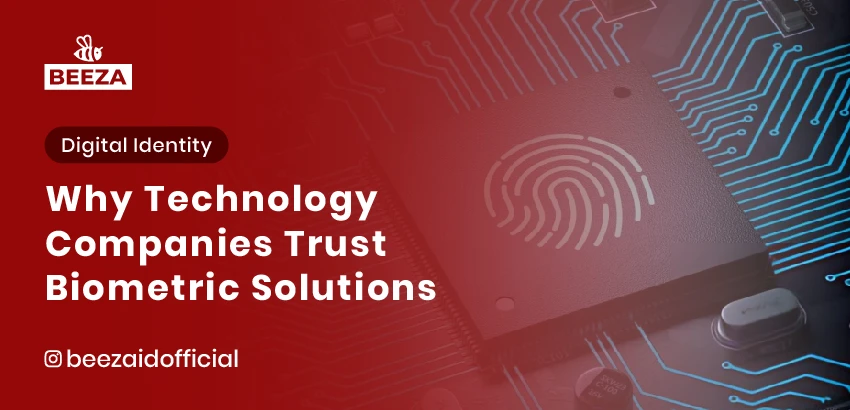
Data security has become a primary concern in the digital era. As cyberattacks grow more sophisticated, technology companies are continuously seeking ways to safeguard their digital assets. One solution that has gained significant traction is biometric technology. By leveraging unique human characteristics such as fingerprints, facial recognition, or voice, biometrics offer a reliable way to identify and authenticate individuals. This article explores why technology companies increasingly trust biometric solutions and how these technologies provide a high level of protection.
Why Biometric Solutions Are the Top Choice
Here are some reasons why biometric solutions are trusted by technology companies:
- Superior Security:
Biometric technology offers far greater security compared to traditional methods like passwords or PINs. Biometric data is unique to each individual, making it nearly impossible to hack or replicate. - Enhanced User Experience:
Biometric authentication is fast and convenient. Users don’t need to remember complex passwords or carry additional devices. Access can be granted with just a fingerprint or facial scan. - Fraud Prevention:
Modern biometric technology includes liveness detection features to ensure the biometric data originates from a real person, not fake images or videos. - Regulatory Compliance:
With stricter regulations like GDPR and CCPA, biometrics help companies meet high-security standards by adding an extra layer of protection for personal data. - Operational Efficiency:
By automating the authentication process, companies can reduce the time and resources required for managing user access, improving overall productivity. - Boosts Customer Trust:
Users are more likely to trust platforms that provide high-level security. Biometric technology helps strengthen relationships between companies and their customers.
Key Technologies in Biometric Solutions
Biometric solutions use advanced technologies to ensure reliability and security, including:
- Facial and Fingerprint Recognition:
These technologies use algorithms to detect unique patterns in a user’s face or fingerprint. - Liveness Detection:
This feature differentiates between authentic biometric data and digital manipulations like photos or videos. - Artificial Intelligence (AI):
AI enhances the accuracy of identification and detects potential security threats. - Data Encryption:
Biometric data is encrypted to prevent unauthorized access during storage and transmission. - Cloud Integration:
Cloud-based solutions allow global accessibility and provide flexibility for managing user data.
Challenges Faced by Technology Companies
Despite their advantages, biometric implementation comes with challenges:
- High Implementation Costs:
Developing and integrating biometric solutions require substantial initial investment, especially for smaller companies. - Privacy Concerns:
Users often worry about how their biometric data is stored and used. Transparency is crucial in addressing these concerns. - Technology Compatibility:
Not all devices support biometric technology optimally, requiring companies to ensure compatibility. - Data Breach Risks:
While secure, leaked biometric data poses significant risks due to its immutable nature. Additional security measures are essential.
Solutions We Offer
We provide various biometric features to help technology companies address these challenges:
- Multi-Factor Authentication:
Combining biometrics with other factors like PINs or OTPs for enhanced security. - High-Level Encryption:
Storing biometric data in encrypted formats ensures user privacy and security. - Easy Integration:
Our solutions are designed to integrate seamlessly with various systems and platforms without disrupting existing operations. - Real-Time Monitoring:
AI-based analytics detect and prevent threats in real-time. - Scalability Support:
Our solutions can scale to meet the needs of companies of all sizes, from startups to large corporations.
Case Study: Enhancing Application Security
Problem:
A technology company faced increasing hacking attempts on its application, which relied on passwords as the primary authentication method.
Solution:
The company adopted biometric technology with liveness detection features, allowing users to log in using facial recognition while ensuring data authenticity.
Result:
Security improved by 40%, and user complaints decreased as the login process became faster and more convenient.
New Opportunities:
Beyond improving application security, the biometric solution opened opportunities for integration with other services, such as digital payments and access control.
Benefits of Biometric Solutions
Adopting biometric technology offers numerous benefits, including:
- Unmatched Security:
Protecting sensitive data from hacking attempts. - Operational Efficiency:
Fast authentication processes save users time and boost productivity. - User Trust:
Customers feel more secure with platforms that employ biometric technology. - Scalability:
Biometric solutions can be applied across various sectors, from banking to e-commerce. - Driving Innovation:
This technology serves as a foundation for developing more secure and innovative services.
Key Takeaways
- Biometric technology provides high-level security and an improved user experience.
- Features like liveness detection and data encryption enhance system reliability.
- Despite challenges, biometric solutions deliver significant value for technology companies.
- A case study highlights how biometrics can enhance application security and user satisfaction.
- These solutions also create opportunities for innovation and additional services.
Conclusion
Biometric technology is the future of security in the digital era. With its advantages in security, efficiency, and convenience, it represents a strategic investment for technology companies. Implementing biometrics not only protects data but also fosters trust among users of digital platforms.Contact us for system integration solutions in verification, identification, credit scoring, digital signatures, and more for various industries.